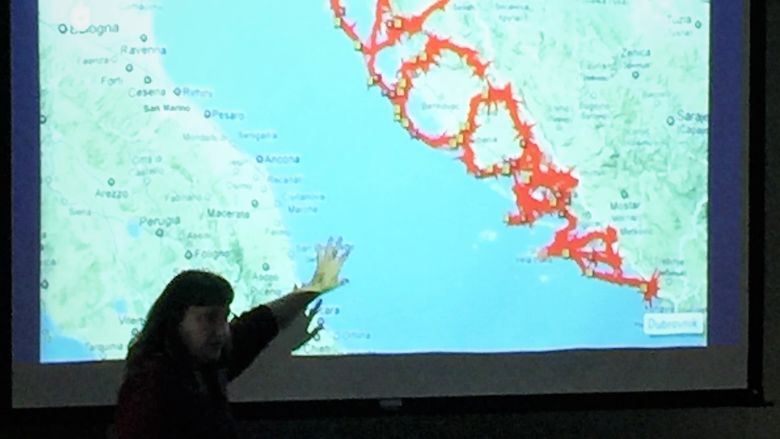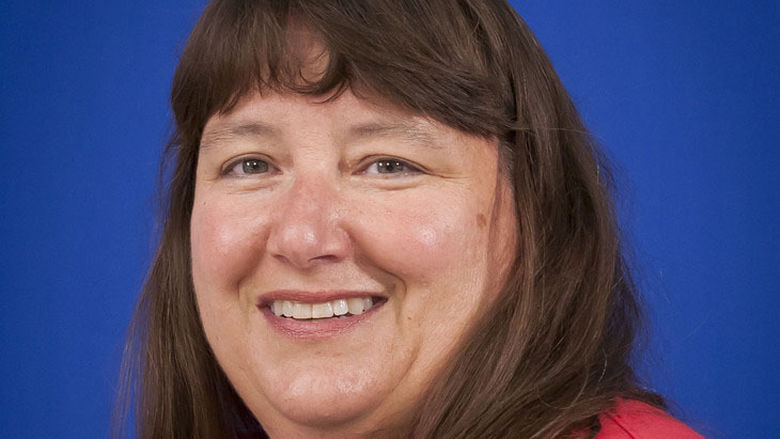Plastic waste that has washed up along the shoreline in Croatia, polluting the natural and marine environment. At left, Kyle Walsh, an alumnus of Penn State Scranton and a former student of Renee Bishop-Pierce, takes notes of the scene. Walsh spent three weeks doing research this summer in Croatia.
UNIVERSITY PARK, Pa. — There is a chance that you may be eating or drinking plastics. Yes, you read that correctly — microplastics, tiny particles of plastic, are present in common household products such as toothpaste, health and beauty products and some cleansers, according to researchers.
Penn State Scranton Associate Professor of Biology Renee Bishop-Pierce, has begun working on a collaborative project with colleagues at the University of Split, located in Split, Croatia, a research program to examine the impacts of microplastics on the aquaculture industry and human consumption.
Global Program’s Split-PSU Collaboration funds will help establish the program.
Bishop-Pierce has worked on coastal processes and the impact of subterranean groundwater on coastal productivity for years. She has recently expanded her research to examine the impacts of microplastics on aquaculture.
"Over the last couple of years, our awareness of the pervasiveness of plastics in the environment has increased dramatically."
— Renee Bishop-Pierce, associate professor of biology, Penn State Scranton
Worldwide production of plastics has increased since 1950 and a large portion of those plastics end up in the world’s oceans. The plastics break down slowly, eventually being consumed by aquatic organisms and entering the marine food chain.
Zvjezdana Popovic Perkovic, assistant professor at the University Department of Marine Science, and Bishop-Pierce, will determine the impacts of microplastics on aquaculture by examining the impacts on mussels, molluscs that filter their food and ultimately, plastic from the water and the long-term effects of this global matter.
These findings effect not only the environment, but increasing scientific evidence indicates that humans may be consuming the plastics as well.
"Over the last couple of years, our awareness of the pervasiveness of plastics in the environment has increased dramatically," said Bishop-Pierce. "The funded project will look at current levels of microplastics in bivalves from the Adriatic, the impact the plastics have on aquaculture and the flow of microplastics from the marine environment to consumers."
Penn State undergraduates and Split University graduate students will be included in the research.
Sustainability is at the forefront of this research, which comes at a time when there is a global awareness of the threat from plastics in our oceans, which potentially ends up in our food, said the researchers. Penn State continues to fulfill its commitment to environmental awareness and sustainability by allowing these international collaborations to become possible.
To view photos from Bishop-Pierce's research trip to Croatia, click here.
Research team members include University of Split participants Zvjezdana Popović Perković (leader), Ivana Generalić Mekinić, Danijela Skroza and Jelena Nejašmić; and Penn State participants Renee E. Bishop Pierce (leader), associate professor of science at Penn State Scranton, and Amit Sharma, professor of hospitality of management/finance at Penn State University Park.
For more information on the Global Programs awards, visit https://news.psu.edu/story/526850/2018/07/10/academics/global-programs-announces-penn-statesplit-2018-fund-awardees


